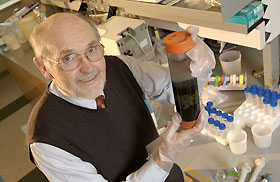2012 Rydell ProfessorshipFeaturing William Fitzgerald
 William Fitzgerald
William FitzgeraldMarine bio-geochemist and chemical oceanographer William Fitzgerald has been called “the father of mercury research.” His interests are in atmospheric and marine chemistry with particular emphasis on global bio-geochemical cycles of trace metals, and the environmental impact of metal emissions associated with human endeavors. In the early 1970s he established The Mercury Laboratory at University of Conneticut, which has been recognized nationally and internationally for pioneering work with the complex and ultra-trace cycling of mercury in the environment.
A native Bostonian, Fitzgerald received his B.S. and M.S. degrees in chemistry from Boston College and the College of the Holy Cross, respectively. In 1970 he earned the first Ph.D. granted in a joint Woods Hole Oceanographic Institute/Massachusetts Institute of Technology chemical oceanography program. In that same year, he joined the faculty at UConn, where he has had almost continuous NSF funding for his research. In 2003 he received the Geochemical Society’s Patterson Award for his contributions to environmental chemistry, and in 2011 he was honored with the first Kathyrn R. Mahaffey Lifetime Achievement Award in Mercury Research.
Fitzgerald will be one of eight keynote speakers the 2012 Nobel Conference and is served as the College’s Rydell Professor the fall of 2012.
Fitzgerald was involved in an upper level special topics course in oceanography as part of his duties as the 2012 Rydell Professor. The course was taught by six different Gustavus faculty members including Julie Bartley (Geology), Joel Carlin (Biology), Jeff Jeremiason (Chemistry), Chuck Niederriter (Physics), Brian O’Brien (Chemistry), and Laura Triplett (Geography).
Fitzgerald delivered a public talk titled “Iron in the Oceans: What’s the Fuss About?"l. Fitzgerald’s lecture intended to be a prelude to the 48th annual Nobel Conference, “Our Global Ocean,” and explored the biogeochemical basis for the provocative claim that half a sea-going tanker of iron would yield another ice age.